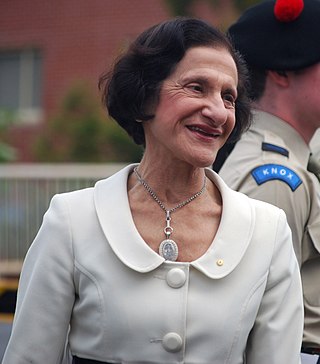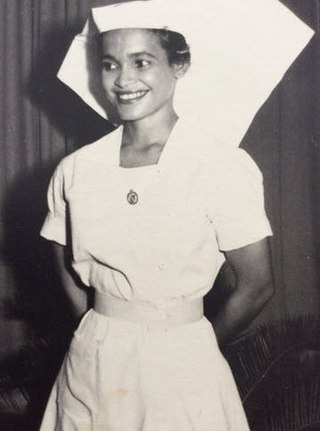
Dame Marie Roslyn Bashir is the former and second longest-serving Governor of New South Wales. Born in Narrandera, New South Wales, Bashir graduated from the University of Sydney in 1956 and held various medical positions, with a particular emphasis in psychiatry. In 1993 Bashir was appointed the Clinical Director of Mental Health Services for the Central Sydney Area Health Service, a position she held until appointed governor on 1 March 2001. She has also served as the Chancellor of the University of Sydney (2007–2012). Bashir retired on 1 October 2014 and was succeeded as governor by General David Hurley.

Central Queensland University is an Australian public university based in central Queensland. CQUniversity is the only Australian university with a campus presence in every mainland state. Its main campus is at Norman Gardens in Rockhampton, however, it also has campuses in Adelaide (Wayville), Brisbane, Bundaberg (Branyan), Cairns, Emerald, Gladstone, Mackay, Melbourne, Noosa, Perth, Rockhampton City, Sydney and Townsville. CQUniversity also partners with university centres in several regional areas across Australia.
Ingrid Moses, an Australian academic and former university administrator, is an emeritus professor at the University of Canberra. After a long academic career in Australia, Moses served as the Chancellor of the University of Canberra between 2006 and 2011.
Nicholas Andrew Saunders, is an Australian academic who served as the Vice-Chancellor of the University of Newcastle from 2004 to 2011.
Fay Gale AO was an Australian cultural geographer and an emeritus professor. She was an advocate of equal opportunity for women and for Aboriginal people.
Nicholas Talley is an Australian gastroenterologist, epidemiologist, researcher, and clinical educator. Most of his work centers on FGIDs.
Annabelle Claire Bennett is the Chancellor of Bond University and a former Judge of the Federal Court of Australia.
Stephen Bruce Dowton is the fifth Vice-Chancellor and President of Macquarie University in Sydney, Australia. He is a paediatrician, researcher, and academic, and has served as a senior medical executive at universities, healthcare institutions, and consulting organisations.
Professor Dame Jessica Lois Corner DBE FMedSci is a British nurse, academic, educator and author. She is currently the Executive Chair of Research England. She was previously Professor of Cancer and Supportive Care, and Pro-Vice-Chancellor for Research and Knowledge Exchange at the University of Nottingham.
Mary Josephine O'Kane, AC an Australian scientist and engineer, is the Chair of the Independent Planning Commission of New South Wales. She is also a company director and Executive Chairman of O’Kane Associates, a Sydney-based consulting practice specialising in government reviews and research and innovation advice to governments in Europe, Asia and Australasia.

Susan Margaret Pond is an Australian scientist and technologist, active in business and academia, and recognised for her contributions to medicine, biotechnology, renewable energy and sustainability. She is the current president of the Royal Society of New South Wales.
Cindy Anne-Maree Shannon is an Australian academic best known for her work in the field of Indigenous health.

MaryAnn Bin-Sallik is a Djaru Elder and Australian academic, specialising in Indigenous studies and culture. She was the first Indigenous Australian to gain a doctorate from Harvard University.
Isabella Caroline McMillen is an Australian medical and health academic and was Chief Scientist of South Australia from October 2018 to August 2023. She is a Fellow of the Australian Academy of Health and Medical Sciences, a Fellow of the Royal Society of New South Wales and a Bragg Member of the Royal Institution of Australia. She is a Director of Compass Housing Services Co Ltd, the South Australian Health and Medical Research Institute, the Australian Science Media Centre and a member of the Council of the University of South Australia.
Clare Elizabeth Collins is an Australian dietician who is Professor of Nutrition and Dietetics at the University of Newcastle. She serves as Director for Research in the School of Health Sciences and Deputy Director of the Priority Research Centre. She was awarded the 2017 Hunter Medical Research Institute Researcher of the Year and is a Fellow of Dietitians Australia.
Lisa Rae Jackson Pulver is an Aboriginal Australian epidemiologist and researcher in the area of Aboriginal health who has been Deputy Vice Chancellor at the University of Sydney since October 2018.
Lynette Wendy Russell, is an Australian historian, known for her work on the history of Indigenous Australians; in particular, anthropological history ; archaeology; gender and race, Indigenous oral history, and museum studies.
Eileen Baldry is an Australian criminologist and social justice advocate. She is a Professor Emerita of Criminology at the University of New South Wales (UNSW), where she has been an academic since 1993, and was the inaugural Deputy Vice-Chancellor Equity Diversity and Inclusion from 2017-2022.

Emily Banks is an Australian epidemiologist and public health physician, working mainly on chronic disease. She is a Professor of Epidemiology and Public Health and Head of the Centre for Public Health Data and Policy at the Australian National University, and a visiting professor at the University of Oxford.




